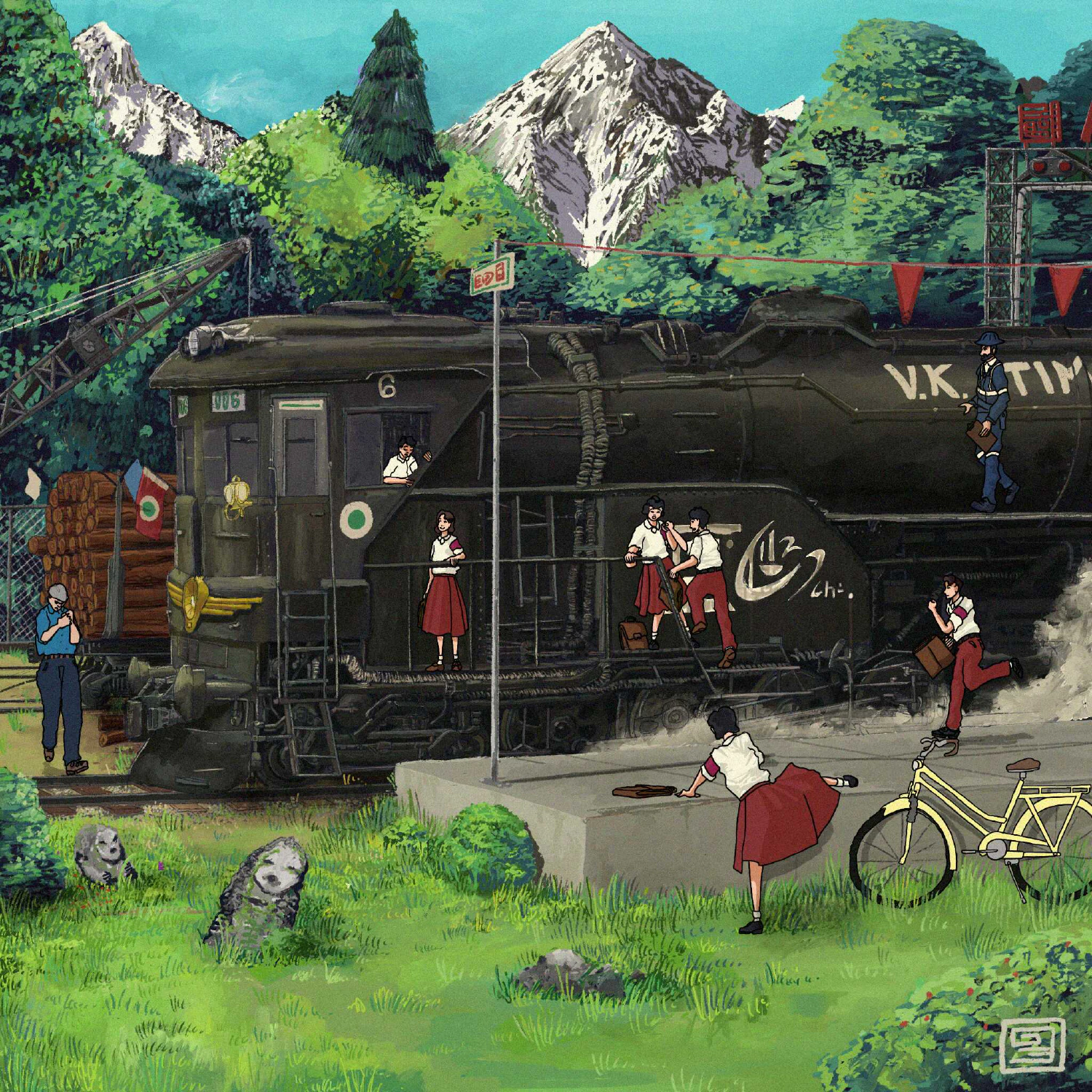NEW Story: Sunday Morning
Catching a steam locomotive to school

This article is not part of Vekllei canon. It may be old, obsolete or just a bit of fun.
Most of the kids pictured here are the cubs of lumberfolk who make a living out of felling hard pines in the mountains in the North of Vekllei. About half have dark hair and rounder faces, as descendants of both inuits and Scandinavians, and others are of mixed ancestry. Families in Vekllei are large and often nonbiological, and a single lad can have a dozen sisters. Ame Louisendopet might be a bitch on occasion, but that’s how it goes. Jo’s little sister, Popet, has decided age ten and a half that she’ll be a locomotive engineer one day.
As you may have learned by now, Vekllei is a land of contrasts. Last year, the Lonne Rail Authority commissioned a new generation of maglev trains for blistering five-minute commutes between Little Vekllei and the Lonne terminus, turning an otherwise 60km journey into an unconscious gesture. At a top speed of 750km/h, the pride of Vekllei’s commuter rail seems to gunning for subsonic commuter jets head-on.
Meanwhile, in the mountains around Montre, the D-006 steam locomotive approaches her 130th birthday. Where the maglev guzzles direct current from atomic power plants around the country, D-006 chews through bunker fuel — literal scrapings from a barrel somewhere — and leaves soot where she goes. Her train is not carrying businessfolk but log cars bound for the coasts, where they will be sold to Europe for furniture. In the mornings of most weekdays, the engineers and lumberjacks that man her bring their children along for the trip, where the little ones watch the engineer work the cab while the teenagers shiver on her maintenance catwalks.
She is dirty, slow, and makes absolutely no sense occupying a route in the space age, one marked by moon colonies and new empire. What is going on here?
Things begin to make a little more sense through the lens of an ordinary Vekllei person, with their own bizarre domestic intuition and frame of mind. Like we talked about previously, Vekllei understands the the achievements of industry as a liberationist tool to return to preindustrial, satisfying life. It is not as though the country will ‘undo’ three centuries of tremendous progress — quite the contrary, in fact. But understood through petticoat ideology, the marriage of labour and the ordinary person can only occur through self-satisfying, personal work. This is in contrast, one can suppose, to mechanised, industrial labour to which we owe our enormous wealth. To a Vekllei person, work is social, productive, creative and satisfying. The simple pleasures of agriculture; specialised craftsman and tradesman; artistry — these are the fruits only of a society that can afford them, since they necessitate the deindustrialisation of agriculture, factory manufacturing and mass media simultaneously.
The steam locomotive is ultimately a fetishisation of this sort of thinking — it is an analogue machine, complicated while comprehensible to the ordinary person (unlike, say, atomic energy or even gas-turbine locomotives). It is enormous and impressive, and also nostalgic for many Vekllei people. In a place and time where money did not matter, as it does not in Vekllei, and productivity was an afterthought, as it is in Vekllei, they make perfect sense. These ‘images’; of rural labour assisted by steam locomotives; of children growing up with these machines; of the constant fetishisation and decommodification of the world — these are currency in Vekllei. That is why this useless machine is a wonderful machine, and why a handful of steam locomotives mother their respective communities decades after their obsolescence.
you can check my reddit profile (and there’s a follow button there now, because reddit is Facebook) for more posts about Vekllei and Tzipora.
www.vekllei.city or insta fer more. I love questions. tahnk